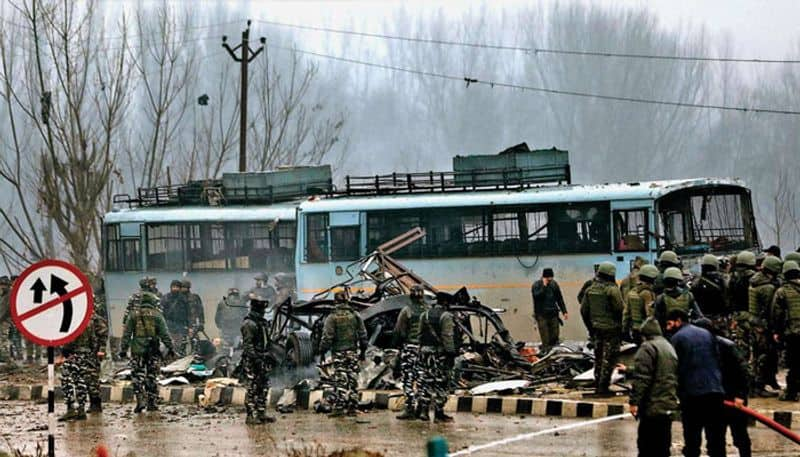With the Pakistan-based Jaish-e-Mohammed (JeM) having claimed responsibility for what is easily the biggest terror strike in J&K since 2001, Islamabad cannot escape the blame for harbouring and protecting the terrorist group although the Pakistani Foreign Office has denied any link
By Nitin A. Gokhale
Reverberations of the Pulwama terrorist attack in Jammu and Kashmir on Thursday that killed at least 37 personnel of the CRPF will go far beyond India’s borders and will have repercussions on India’s relations with Pakistan and China.
With the Pakistan-based Jaish-e-Mohammed (JeM) having claimed responsibility for what is easily the biggest terror strike in J&K since 2001, Islamabad cannot escape the blame for harbouring and protecting the terrorist group although the Pakistani Foreign Office has denied any link. Pakistan’s High Commissioner to India Sohail Mahmood was summoned by Foreign Secretary Vijay Gokhale on Friday afternoon and served a strong demarche. It was conveyed to him that Pakistan must take immediate and verifiable action against the JeM and that it must immediately stop any groups or individuals associated with terrorism operating from its territory.
Meanwhile, India’s Cabinet Committee on Security (CCS)—the highest body that decides the country’s strategic, military and security choices—has decided to take all possible diplomatic steps to isolate Pakistan internationally. Within that framework, India has also decided to withdraw the ‘Most-Favoured Nation’ status granted to Pakistan over two decades ago. Even as India’s Finance Minister Arun Jaitley was announcing these two measures immediately after the CCS meeting on Friday morning, Prime Minister Narendra Modi publicly announced that the security forces have been given a ‘free hand to take necessary action against the perpetrators of the attack.’ In what is seen as a clearest message to Pakistan, the Prime Minister warned the terrorists and their handlers (read Pakistan) that they have made a massive mistake (in launching the Pulwama attack). The culprits would be brought to book, he vowed. For the moment, India has stopped short of downgrading or cutting off diplomatic ties with Pakistan but the External Affairs Ministry is likely to go all out to share details about Pakistan’s complicity in terror attacks on India, especially in the latest one at Pulwama.
The United States, Russia, UK, France, Australia and India’s neighbours Sri Lanka and the Maldives have already condemned the attack. The White House statement is one of the strongest in recent times. It said: “The United States calls on Pakistan to end immediately the support and safe haven provided to all terrorist groups operating on its soil, whose only goal is to sow chaos, violence and terror in the region.”
Russian President Vladimir Putin too condemned the ‘cruel crime’. China, which has thrice bailed out Pakistan in the past by consistently blocking efforts by India and UN Security Council members to list JeM Chief Masood Azhar as a UN designated terrorist, issued a bland statement saying, “We are deeply shocked by this attack. We express deep condolences and sympathy to the injured and bereaved families.”
Perhaps, New Delhi will have to re-engage with Beijing to convince the Chinese about the need to review their opposition to brand Azhar a global terrorist, even if it is a lost cause.
While diplomatic and political efforts will be intensified, India’s security establishment is already at work to draw up military options. Given the mood, the Prime Minister’s declaration and the timing of the attack in Pulwama, the Modi government will be under tremendous pressure to exercise the kinetic option, despite an in-built risk of limited escalation with Pakistan.
What shape the military action can take is in the realm of speculation but the fact is the security situation in the Kashmir valley is fraught at the moment. There were some visible lapses too in the way the 78-vehicle convoy was travelling from Jammu to Srinagar when the Jaish suicide bomber targeted it on the outskirts of Srinagar, ramming an explosive-laden SUV into one of the CRPF buses carrying personnel returning from leave. For one, the convoy was too long but understandable since the highway was closed for three-four days due to heavy snowfall. Another question that needs to be answered after proper investigation is the claim that there was enough intelligence on a possible suicide attack.
Finally, it is now clear that Pakistan’s ISI has decided to use the Jaish as its sword arm and rein in the Lashkar-e-Taiba of late. After Pathankot in January 2016, the Jaish has pulled off another audacious attack, plunging the already frozen India-Pakistan relations to another low.
This article was originally published in Strategic News International
Last Updated Feb 15, 2019, 7:44 PM IST











![Salman Khan sets stage on fire for Anant Ambani, Radhika Merchant pre-wedding festivities [WATCH] ATG](https://static-ai.asianetnews.com/images/01hr1hh8y86gvb4kbqgnyhc0w0/whatsapp-image-2024-03-03-at-12-24-37-pm_100x60xt.jpg)
![Pregnant Deepika Padukone dances with Ranveer Singh at Anant Ambani, Radhika Merchant pre-wedding bash [WATCH] ATG](https://static-ai.asianetnews.com/images/01hr1ffyd3nzqzgm6ba0k87vr8/whatsapp-image-2024-03-03-at-11-45-35-am_100x60xt.jpg)



